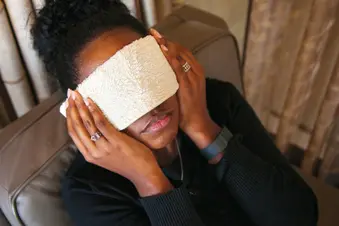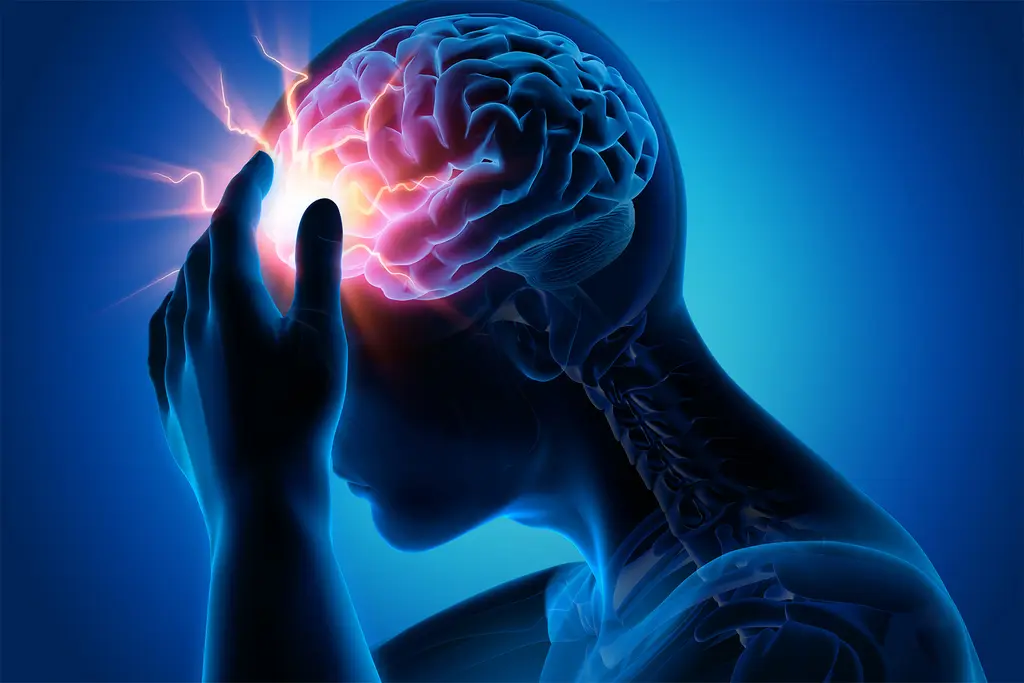
Migraine is a neurological condition known to cause episodes of serious head pain. These recurrent “attacks” can also make you feel sick to your stomach or cause sensitivity to light, sound, and touch.
Scientists don’t know why some people get migraine headaches and others don’t. But you can take steps to avoid or stop your pain. Ask your doctor to go over the pros and cons of all your treatment choices.
Medication for Migraine Headaches
Which medication your doctor suggests depends on several things. They’ll consider how often you get migraine headaches and their intensity, or how strong they are. Whether you get other migraine symptoms or medication side effects may also play a role in which one they pick for you.
Drugs used to treat migraine headaches include:
Over-the-counter medication. These are usually recommended for people who don’t get nausea or vomiting during an acute migraine attack. These may include nonsteroidal anti-inflammatory drugs (NSAIDs) or other options. Some meds your doctor might suggest are:
- NSAIDs like ibuprofen or naproxen sodium
- Acetaminophen
- A combo of acetaminophen + aspirin + caffeine
Tell your doctor if OTC drugs don’t help or you use them a lot. Many people with migraine often need prescription treatment to feel better. And with better treatment, you may need to take less pain medication overall.
Fast-acting treatment. You can take special drugs to stop a migraine headache after it starts. Also known as acute, these medications get rid of head pain by targeting chemicals involved in the migraine process itself.
The right acute treatment should get you pain-free within 2 hours, especially when you take these migraine-specific meds at the first sign of head pain.
Examples of acute migraine treatment include:
- Triptans
- Lasmiditan
- Gepants (also called CGRP blockers/antagonists)
- Dihydroergotamine (DHE)
Acute migraine drugs come as a pill, shot, or nasal spray. But your doctor might suggest you opt for non-oral routes if you feel sick. Drugs that go directly into your bloodstream (not through your stomach) kick in fastest.
Preventive treatment. There’s no cure for migraine currently. But ongoing migraine treatment can lessen the number and intensity of future headaches. Preventive treatment can also help acute drugs work better.
Around 40% of people who get migraines could benefit from preventive therapy, but less than 13% of folks in this group use this kind of treatment.
Talk to your doctor about preventive therapy if you have:
- Four or more headaches a month
- Eight or more headache days each month
- Strong headaches that impair daily life
- A poor response to acute treatments
- Medication overuse headache
Types of preventive drug treatment for acute migraine may include:
- Blood pressure drugs
- Anti-seizure drugs
- Antidepressants
- Certain CGRP antagonists
CGRP drugs block calcitonin gene-related peptide (CGRP). That’s a pain signaling protein released during a migraine attack. These newer drugs typically come as a monthly shot or through a vein in your arm. But your doctor will let you know how often you need this preventive treatment.
Other medication. Some people get migraines because of hormonal changes. For example, attacks may pop up more often around your period. This is called menstrual-associated migraine. Your doctor might suggest you take NSAIDs or triptans around your period if this happens to you.
Strong pain relievers like opioids typically aren’t used to ease migraine pain. But they’re something your doctor might suggest for a short time if nothing else works.
Do Botulinum Toxin Shots Stop Migraine Headaches?
Botulinum toxin (Botox) is commonly used to get rid of wrinkles in the face. But there’s good evidence it can lessen headaches and is used as preventive medicine in people with chronic migraine. That’s when you have at least 15 headache days a month.
Researchers think botulinum toxin stops migraine episodes from happening by blocking pain signals between the brain and spinal cord. But it can take several weeks and repeat treatments before you notice a difference in your headaches.
Botulinum toxin shots are generally considered safe. But they’re not recommended for everyone. Your doctor will let you know if they’re right for you.
Can Nerve Surgery Stop Migraine Headaches?
Scientists aren’t sure what causes migraine. But the nerves in your face and neck may trigger pain and sensitivity during episodes. For people who don’t respond to other treatments, nerve release surgery may lessen the number and strength of future headaches.
The type of surgery you need depends on where you get migraine pain. But your doctor may decompress nerves and surrounding tissue near your eyes, forehead, or back of the head.
Surgical treatment for migraine can give long-lasting relief. While surgery isn’t right for everyone, it’s worth bringing up with your doctor if you have severe headaches or head pain that never goes away.
Can Neuromodulation Devices Stop Migraine Headaches?
Brain stimulation can ease headaches or lower your chances of future attacks. Neuromodulation is something your doctor might suggest if other treatments don’t work very well, aren’t safe for you, or cause too many side effects.
Neuromodulation sends pain-free pulses from electricity or magnets to change brain activity. There are a growing number of handheld devices that use this technology to treat or stop migraine headaches from happening. You’ll need to get a prescription from your doctor, but you can use these tools alone or with drug treatment.
Your doctor will let you know if brain stimulation is right for you. Some devices you can ask them about include:
- Non-invasive vagus nerve stimulation
- Remote electronic neuromodulation (REN)
- Electrical trigeminal nerve stimulation
- Single-pulse transcranial magnetic stimulation
Home Remedies for Migraine
Always talk to your doctor about the best treatment for your headaches. But on top of medication, you may feel better during an attack if you do the following:
- Lie down somewhere dark and quiet.
- Put something cold on your forehead or neck.
- Rub your scalp, using pressure.
- Press on your temples
- Take a nap.
Some people say they feel better when they drink something with caffeine in it. But keep in mind that too little caffeine can cause a withdrawal headache if you suddenly forgo your morning cup of Joe.
Lifestyle Changes for Migraine
Migraine is a health condition that often needs medical treatment. And researchers have yet to find a clear link between outside triggers and attacks. But some people say they have fewer headaches when they make certain day-to-day changes. You may hear this called headache hygiene. Do your best to:
Sleep. The migraine brain likes consistency, so try to go to bed and get up at the same time every day. Tell your doctor if you have trouble falling or staying asleep. Many people with migraine also have insomnia. Treatment can help you get a good night’s rest.
Exercise. Lots of movement may worsen a migraine that’s already started. But regular exercise may actually help ward off future episodes. Aim for at least 30 minutes of aerobic activity most days of the week.
Eat. Experts don’t agree on whether food triggers a migraine. In fact, it’s more likely that you crave certain things right before you get a headache. But studies show going a long time without food may make you more sensitive to head pain. Try to eat small meals throughout the day.
Keep a diary. Keep track of when you have attacks and what happens before you get an episode. This may help you pinpoint foods, behaviors, or things in the environment that make your pain worse. A diary is also a good way to document if your medication is working
Here are some things to write down about your treatment:
- Each day you take medication
- How many doses you need
- How long it takes for your headache to go away
- If your medication doesn’t completely get rid of your headache
Manage stress. The relationship between stress and migraine isn’t clear. But there’s some evidence that high levels of stress that stop suddenly – like going from work to the weekend – may trigger a headache in some people. This is called a “let-down” migraine. Experts aren’t sure why this happens.
While you can’t get rid of stress, you can learn how to manage it. Ask your doctor if mindfulness-based stress reduction, meditation, yoga, or other relaxation techniques may help you feel calmer throughout the day.
Show Sources
Photo Credit: WebMD
SOURCES:
UpToDate: “Migraines in adults,” “Acute treatment of migraine in adults.”
Merck Manual: “Migraine: Consumer Version,” “Migraine: Professional Version.”
Anne Yacoub, MD, co-director, Johns Hopkins Headache Center; assistant professor of neurology, Johns Hopkins University School of Medicine.
Christopher Gottschalk, MD, director, Yale Headache & Facial Pain Center; professor of neurology, Yale School of Medicine.
American Family Physician: “Migraine Headache Prophylaxis.”
Yale Medicine: “Could Newer Migraine Drugs Bring You Relief.”
Johns Hopkins Medicine: “Botulinum Toxin Injectables for Migraines.”
Massachusetts General Hospital: “Migraine Surgery Program.”
Journal of Neurology, Neurosurgery & Psychiatry: “Non-invasive neuromodulation for migraine and cluster headache: a systematic review of clinical trials.”
Current Pain and Headache Reports: “Update of Neuromodulation in Chronic Migraine.”
American Migraine Foundation: “Neuromodulation for migraine treatment: An overview,” “What to Know About the New Anti CGRP Migraine Treatment Options,” “Migraine Home Remedies,” “Lifestyle Changes for Migraine Management.”
FamilyDoctor.org: “Migraines.”
